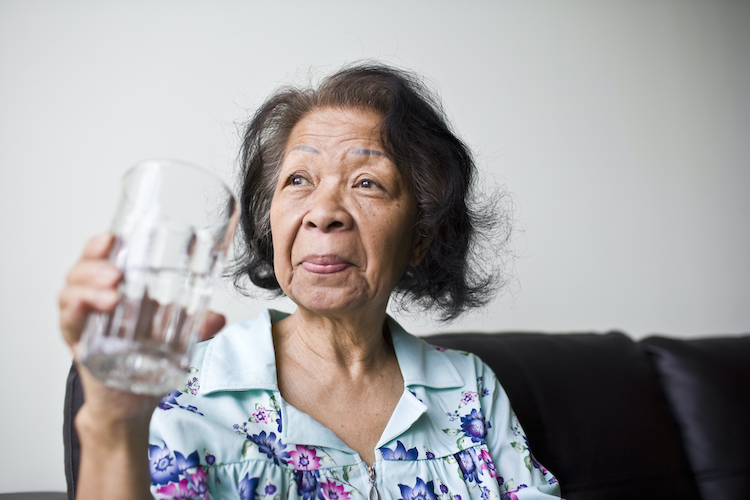
Knowing the symptoms of dehydration in the elderly is important.
During this warmest time of year, maintaining proper hydration is crucial, particularly for older adults. In fact, approximately 50% of all seniors are chronically under-hydrated, as documented in a recently available UCLA study, which can lead to a plethora of health problems, such as kidney stones, urinary tract infection, as well as a greater risk for falls.
The frequency of dehydration in older adults is linked to a number of factors, such as:
- A reduced volume of water commonly occurring in aging bodies
- Medication side effects
- Less sensitivity to the sensation of thirst
- A reduced ability to maintain a proper fluid level balance in the body
- Reduced efficiency in the kidneys
- And more
There’s a basic calculation to establish the amount of water an older adult should drink each day. Take the person’s body weight in pounds, and drink 1/3 that many ounces of water daily. Someone who weighs 120 pounds, for instance, should drink no less than 40 ounces of water – about five 8-ounce glasses.
Time is critical in ensuring hydration in older adults, as it is much simpler to fix mild dehydration before it becomes more severe. Symptoms of dehydration in the elderly include:
Mild Dehydration:
- Decreased, darker-colored urine
- Dry mouth
- Dizziness and fatigue
- Muscle cramping
- Irritability
- Headaches
Severe Dehydration:
- Disorientation and confusion
- Difficulty with walking
- Weak, fast pulse
- Low blood pressure levels
- Worsening muscle cramps
- Sunken, dry eyes
- Skin that is wrinkled and has reduced elasticity
- Bloating
- Quickened breathing
- Convulsions
Obtain medical attention promptly should you suspect dehydration in a senior loved one, to circumvent significant health complications that could possibly develop rapidly.
If a senior loved one resists drinking enough water, try flavoring the water or offering juice, if it is an acceptable part of the senior’s dietary plan. For those with conditions such as diabetes or obesity, the sugar content in juice could be dangerous. In some cases, changing the temperature of the beverage will make it more appealing as well, for example, heating up a cup of water with some lemon to sip on each morning, and then furnishing cold water over crushed ice in the afternoon.
One of the keys is to always have fluids available throughout the day. Geriatric nurse Anne Vanderbilt, CNS, explains, “What I often see in our advanced older adults – people in their 80s and 90s – is that they can’t sit down and drink a full 8-ounce glass of water. It fills them up, causes bloating and then makes them have to run to the bathroom. So little sips throughout the day are better.”
In order to help ensure the older adults you love are remaining hydrated and healthy, partner with Home With You Senior Care. Our caregivers are readily available to help monitor fluid intake, prepare healthy and balanced meals, motivate older adults to remain physically active, and more for optimal health. Contact us at 410-756-0959 for a free in-home evaluation and for additional information about our top-rated elder care in Glyndon and the surrounding communities.
